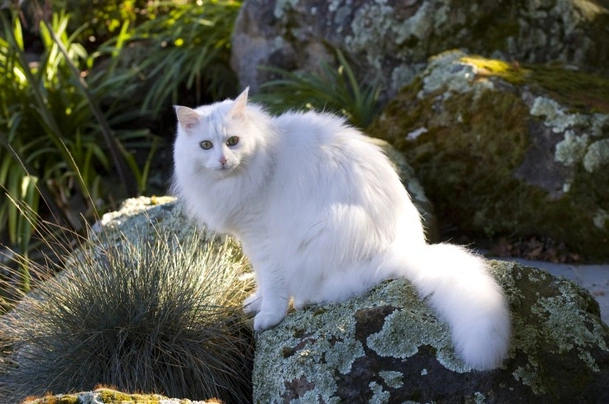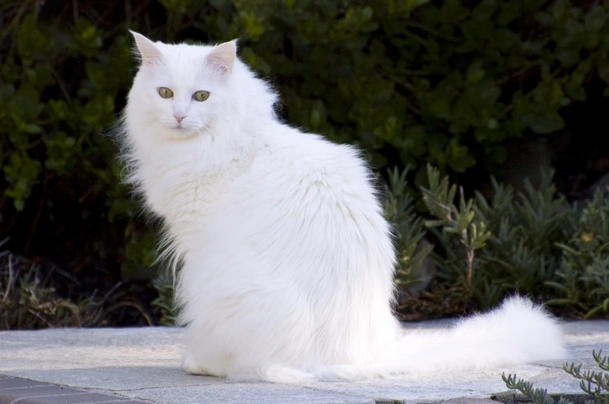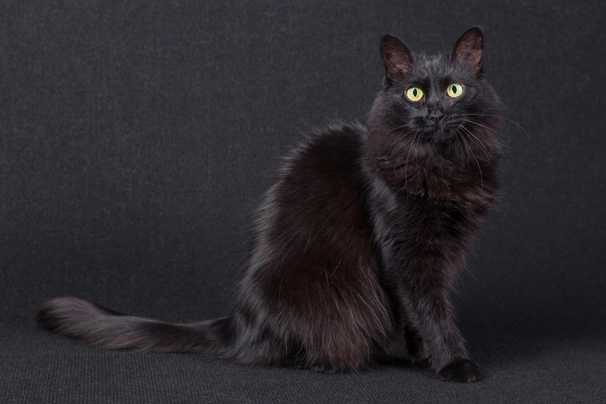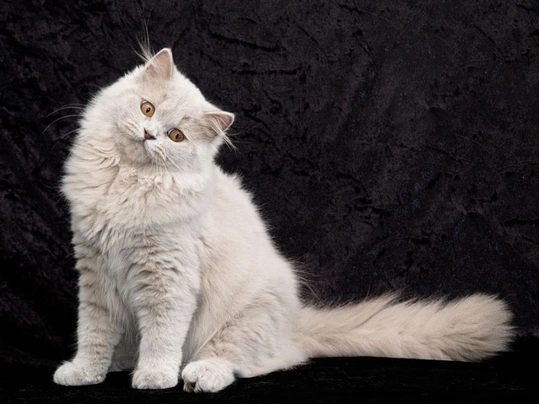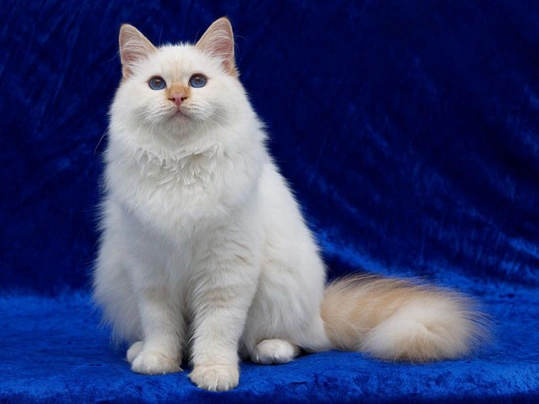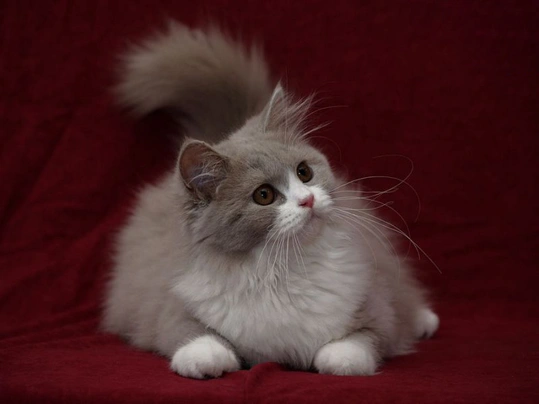Turkish Angora
Introduction of the Turkish Angora
The Turkish Angora is an elegant graceful small to medium sized cat and one that boasts having a super soft silky coat. They are energetic intelligent and a national treasure in their native Turkey where they have always been highly prized. For the moment the breed is not recognised by the GCCF and not many well-bred kittens are available every year. As such anyone wishing to share their home with a Turkish Angora would need to register their interest with breeders for the pleasure of doing so but the wait is well worth it.
History of the Turkish Angora
As their name suggests the beautiful Turkish Angora is native to Turkey where they have always been highly prized. There are records of these cats that date back to the 16th century. Turkish Angoras were used to develop the Persian during the 1900s and it was during this time that these lovely looking vanished as a breed. Luckily the breed was considered a national treasure in Turkey and as such a breeding programme was set up at Ankara Zoo with an end goal being to preserve the Turkish Angora. At the time the zoo only concentrated on preserving white cats that boasted having blue gold and odd coloured eyes. They kept extremely good records of their breeding programmes and did not like any of these beautiful cats being exported to other countries of the world.
It was during the 1950s that American servicemen noticed these beautiful cats when visiting Ankara Zoo but it was not until the early sixties that the zoo allowed an American colonel to own two Turkish Angoras with one being an odd-eye male with a white coat and the other being a female cat that boasted a white coat and amber coloured eyes. These two cats were to become the foundation stock for a new breeding programme that was established in the United States.
Over the following years more breeders took an interest in these striking cats. They were allowed to export more kittens from Ankara Zoo but it was not until the 1970s that Turkish Angoras were established as a breed in North America. Today although not recognised by the GCCF the Turkish Angora is recognised by most other international breed clubs. However anyone wishing to own a Turkish Angora in the UK would need to register their interest with breeders and be put on a waiting list because very few well-bred kittens become available every year.
Appearance of the Turkish Angora
The Turkish Angora is a beautiful cat that boasts having a semi-long coat that's super soft and silky to the touch. Although their hair is semi-long rarely do their coats become matted or knotted which means they are low maintenance on the grooming front. Their coats tend to be shorter and less dense during the summer months but as soon as the cold sets it a Turkish Angora’s coat grows longer. They are well balanced cats and when they move they do so gracefully with males being that much heavier and larger than their female counterparts.
The Turkish Angora has a small to medium sized head that's a slightly modified wedge shape but with flat planes. They have large walnut-shaped eyes that slant a little upwards. Cats always have a kind open expression in their eyes which adds to their endearing looks. Eyes can be any colour and do not necessarily have to match a cat's coat colour. Their ears are wider at the base being large and tufted as well as slightly pointed at the tips. Ears are set high on a cat's head. Their chins are nicely rounded and firm being at a right angle to a cat's nose.
Muzzles match the contours of a cat's wedge-shaped head and when seen in profile there are two planes which consist of the flat top of a cat's head and the line of the nose that meets at an angle a little above their eyes. They have slim moderately long and elegant necks which adds to a cat's graceful appearance.
The Turkish Angora boasts having a long slim body that's foreign in type with their shoulders being the same width as their hips. Chests are narrow with a cat's rump being a little higher than their shoulders. They have long elegant legs with their back ones being longer than their front legs. Feet are oval shaped and small being nicely in proportion with a cat's legs and their toes are tufted. Their tails are wider at the base and beautifully plumed. They taper to a narrow tip and are long but nicely in proportion to the rest of a cat's body.
When it comes to their coat the Turkish Angora boasts having a semi-long coat with a small amount of undercoat. The hair on a cat's body is moderately long and wavy on their bellies and the texture of the hair is fine and silky to the touch. Although the most well known colour is white Turkish Angora come in a multitude of colours which includes the following:
- Black angora
- Blue angora
- Cream angora
- Red angora
- Classic tabby
- Mackerel tabby
- Spotted tabby
- Torbie/Patched tabby
- Smoke
- Shaded Turkish angora
- Bi-colour
- Blue cream
- Tortoiseshell
- Calico
Temperament of the Turkish Angora
Like a lot of other breeds the Turkish Angora likes a routine and doesn't particularly like it when this changes for any reason. They like to be fed at the same time of the day and don't appreciate it when furniture gets moved around the home which can often stress cats out. With this said the Turkish Angora likes to be kept busy and thoroughly enjoys being involved in everything that goes on in their environment. They are extremely agile and athletic which often sees them perched up high which includes on top of open doors.
They are extremely outgoing and affectionate by nature loving nothing more than to spend time with their owners becoming totally devoted to their families. As such they are best suited to families where at least one person stays at home when everyone else is out of the house. They can be a little demanding at times because they crave their owner's attention but this makes these beautiful cats all the more endearing to live with. They boast having a ton of energy which means that anyone who shares a home with a Turkish Angora would need to invest in lots of good quality toys for them to play with so that boredom does not set in.
They can be quite wilful which means when a Turkish Angora has decided to do something there is very little anyone can do to change their mind. They adore being able to explore the great outdoors but cats should only be allowed to roam around outside if it is safe for them to do so. They are extremely talkative by nature and will happily hold long conversations with their owners more especially at meal times when they typically dance around in a charming way so they get more attention.
Intelligence / Trainability of the Turkish Angora
The Turkish Angora is known to be a highly intelligent cat and one that adores playing lots of interactive games with the people they love. They learn new things quickly which includes how to open doors and cupboards so they can check out what’s inside. Being so inquisitive they love to know what is going on in their environment and will follow an owner from room to room to check up on what they are doing. Turkish Angoras like to be in charge and this includes of other pets and animals that share their environment.
Children and other
Turkish Angoras with their outgoing affectionate personalities are a good choice for families with older children who know how to behave around cats. With this said care has to be taken when very young children are around cats and any interaction should always be well supervised by an adult to make sure things stay nice and calm. It's important for younger children to be taught how to behave around cats and when it's time to leave them alone.
They also get on well with dogs especially if they have grown up together in the same household. However care has to be taken when introducing a Turkish Angora to dogs they don't already know just in case the dog does not get on with their feline counterparts. They are social by nature and have been known to get on with pet birds and small animals but it’s important to bear in mind that Turkish Angoras like to be the "boss" in a household. With this said it's always wiser to keep a close eye on any cat when they are around smaller pets particularly when they first meet each other just to be on the safe side.
Health of the Turkish Angora
The average life expectancy of a Turkish Angora is between 12 and 18 years when properly cared for and fed an appropriate good quality diet to suit their ages.
The Turkish Angora is known to be a natural breed and therefore they are considered a healthy one. However there are a couple of conditions worth knowing about if you are planning share your home with one of these beautiful energetic and intelligent cats. The conditions that seem to affect the breed the most include the following:
- Hypertrophic cardiomyopathy (HCM) - breeders should have stud cats screened
- Deafness
Caring for the Turkish Angora
As with other breeds Turkish Angoras need to be groomed on a regular basis to make sure their coats and skin are kept in top condition. On top of this cats need to be fed good quality food that meets all their nutritional needs throughout their lives which is especially true of kittens and older cats.
Grooming of the Turkish Angora
The Turkish Angora boasts having a semi-long coat that's super soft and silky. However they are low maintenance on the grooming front thanks to the fact their hair rarely gets any knots or tangles in it. A twice weekly brush is all it takes to keep their coats in good condition with the good news being that Turkish Angoras love the attention they are given when being they are being groomed and it strengthens the bond they have with their owners.
Like other breeds they tend to shed the most in the Spring and then again in the Autumn when more frequent brushing is usually necessary to keep on top of things. It's also important to check a cat's ears on a regular basis and to clean them when necessary. If too much wax is allowed to build up it can lead to a painful infection which can be hard to clear up. In short prevention is often easier than cure with ear infections. Cats often suffer from ear mites which can be a real problem which is another reason why it's so important to check their ears every week or so.
Exercise of the Turkish Angora
Turkish Angoras have a ton of energy which means they like playing for hours on end. They adore interactive games which includes things like “fetch the toy” or chase the ball around the room because they are extremely adept at using their paws to bat things around the floor and to open any doors and cupboards. They love being able to go outside but as previously mentioned cats should only be allowed to explore the great outdoors if it is safe for them to do so. The good news is that Turkish Angoras adapt well to being house cats providing they have a lot of company and things to keep them occupied.
Cats kept as indoor pets need to be given lots of things to do and places to hide when they want to bearing in mind that Turkish Angoras love to climb up high so they can look down on the world below from a preferred vantage point. They also need to have lots of places they can snuggle up for a snooze when the mood takes them because if there is one thing Turkish Angoras enjoy it's taking a cat nap or two during the day.
Feeding of the Turkish Angora
If you get a Turkish Angora kitten from a breeder they would give you a feeding schedule and it's important to stick to the same routine feeding the same kitten food to avoid any tummy upsets. You can change a kitten's diet but this needs to be done very gradually always making sure they don't develop any digestive upsets and if they do it's best to put them back on their original diet and to discuss things with the vet before attempting to change it again.
Older cats are not known to be fussy eaters but this does not mean they can be given a lower quality diet. It's best to feed a mature cat several times a day making sure it's good quality food that meets all their nutritional requirements which is especially important as cats get older. It's also essential to keep an eye on a cat's weight because if they start to put on too much it can have a serious impact on their overall health and wellbeing. Like all other breeds Turkish Angoras need access to fresh clean water at all times.
Turkish Angora price
If you are looking to buy a Turkish Angora you would need to pay anything from £150 to over £200 for well-bred kitten and you would need to register your interest with breeders and agree to being put on a waiting list because not many well-bred kittens are available every year. The cost of insuring a male 3-year-old Turkish Angora in northern England would be £15.66 a month for basic cover but for a lifetime policy this would set you back £23.89 a month (quote as of February 2018). When insurance companies calculate a pet's premium they factor in several things which includes where you live in the UK a cat's age and whether they have been neutered or spayed among other things.
When it comes to food costs you need to buy the best quality food whether wet or dry making sure it suits the different stages of a cat’s life. This would set you back between £15 - £20 a month. On top of this you need to factor in veterinary costs if you want to share your home with a Turkish Angora and this includes their initial vaccinations their annual boosters the cost of neutering or spaying a cat when the time is right and their yearly health checks all of which quickly adds up to over £600 a year.
As a rough guide the average cost to keep and care for a Turkish Angora would be between £40 to £60 a month depending on the level of insurance cover you opt to buy for your cat but this does not include the initial cost of buying a well-bred kitten.

Turkish angora x
£400
Turkish angora dad Toby mum kittens for sale
£160
